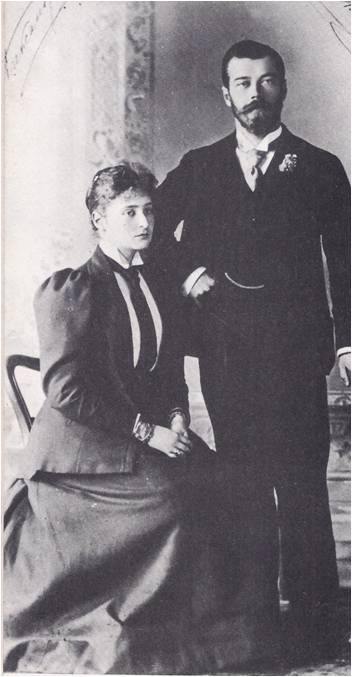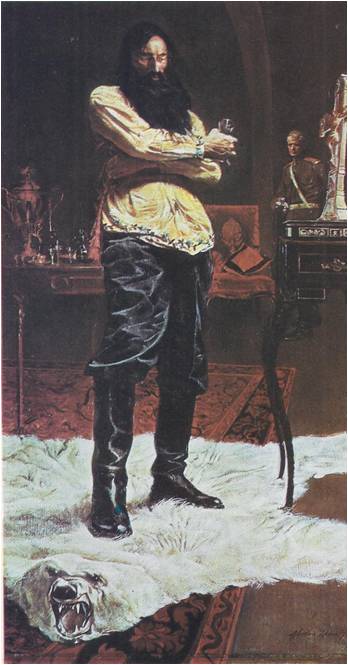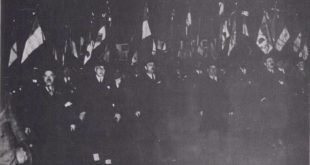THE TSARINA Alexandra was a religious woman. That was why she was immediately interested in Rasputin, when he was introduced to her in 1905. Rasputin was neither a priest nor a monk. He was a starets, or Holy Man. There were a number of such Holy Men in Russia at that time. They left their homes and families to wander about the country, living on charity and devoting themselves to religion. Often people came to them, hoping to hear words of wisdom and advice on how to conduct their lives.
The tsarina, too, felt the need of someone to give her advice and words of wisdom. She was troubled by the problems of the tsar; she kept urging him not to give up any of his power and then there was her fifteen-month-old son. He was the tsarevitch, the prince who would someday be tsar — if he lived. For he suffered from hemophilia, a hereditary disease that prevented his blood from clotting properly. Even a slight wound might cause him to bleed to death.
THE HOLY MAN
Rasputin became a frequent visitor to the palace. It turned out that he had a strange ability to soothe and comfort the tsarevitch and make him forget his pain. Some people said that he hypnotized the boy. At any rate, Alexandra came to believe that her son’s life depended on Rasputin and her faith in him grew from day to day.
With his long beard and his long hair that reached to his shoulders, Rasputin did indeed look like a Holy Man, but the life he led had little to do with holiness. He had an enormous appetite for food and drink. It was no secret around the palace that he spent many a night in wild, drunken parties, staggering home early in the morning. When Alexandra was told this, she refused to listen. Nothing could shake her faith in Rasputin. He had saved the life of her son.

He was a Holy Man who could do no wrong. Many Russians were worried about Rasputin’s influence on the tsarina. Then, in August of 1914, World War I began. France, an ally of Russia, had been attacked by Germany and called for the Russians to strike at Germany in the east. The tsar agreed to enter the war and a great wave of patriotism rolled over Russia. The people forgot Rasputin. They forget their dissatisfaction with the government, the tsar and rallied behind him to fight for their country. They hung out the flag, they prayed, they fell to their knees and sang “God Save the Tsar.” The Duma supported the war. The name of the capital was changed from St. Petersburg, which sounded too German, to Petrograd, a Russian form of the name. The country was united and the tsar and tsarina seemed filled with new energy.
The people might have been less enthusiastic if they had known the condition of the army. Russia was not prepared for war. The Russian soldier was a good fighting man, but his leaders knew little of modern warfare and many of them were dishonest. Supply was a problem; there were not enough arms and ammunition. Within a year, Russia lost Poland, Lithuania and a large part of the Ukraine and White Russia. Millions of men were killed or captured. The government turned on the Jews and mercilessly hunted down anyone suspected of spying, but that won no battles.
Now Nicholas showed his weakness and Alexandra her strength. More and more, the tsar acted on her advice — and she was guided by Rasputin. In September of 1916, Nicholas himself took over the supreme command of the army. The actual rule of the country was left in the hands of Alexandra and Rasputin. Rasputin was not bashful about using his authority. He dismissed and replaced ministers and many other important officials and controlled the church as well.
None of this helped to change the course of the war. In 1916, as the terrible Russian winter came on, men were still dying at the front by the thousands. Soldiers who managed to survive began to desert from the defeated army. At home, they found everyone confused, hopeless and hungry, for food was becoming scarce. Meanwhile, the tsarina was writing to the tsar: “Be the Emperor . . . crush them all under you. . . . We have been placed by God on the throne and we must keep it firm and give it over to our son untouched.”
MURDER OF RASPUTIN
Even the aristocrats, even the people who believed in monarchy, were deeply troubled by what was happening to their country. Speeches were made in the Duma bitterly criticizing the tsarina and Rasputin. To save the country and himself, the tsar must remove Rasputin from a position of authority.

The tsar did nothing and Prince Felix Yusupof decided to act for him. Prince Yusupof was a wealthy aristocrat and the husband of Princess Irina, the tsar’s niece. In the last months of 1916, he plotted with a group of monarchists to kill Rasputin. As part of their plan, Yusupof invited Rasputin to his house. There is some dispute as to what argument Yusupof used to persuade Rasputin to accept the invitation, but in any case he did accept. Around midnight of December 29, Prince Yusupof took the towering monk to a room in the cellar of his house. There, on a table, were poisoned cakes and poisoned wine. In a room above sat the other plotters‚ waiting for news of Rasputin’s death. While they waited, they played a record of “Yankee Doodle” on the phonograph.
They had a long wait. Rasputin ate a few of the poisoned cakes and drank a number of glasses of the poisoned wine, but by two-thirty in the morning he was still alive. Yusupof went upstairs to consult the other conspirators, came back down, shot Rasputin and left him lying on the floor. When Yusupof returned a little later, he was horrified to see Rasputin move. Rasputin rose, followed him up the stairs and roaring, broke through a locked door into the courtyard. One of the conspirators shot him again and kicked him after he fell and Yusupof beat him with a steel rod. Rasputin was then thrown into the icy water of the Neva River, where his body was found on January 1.
RESTLESSNESS AND REVOLT
So, at last, the strange career of Rasputin had come to an end. His murderers were punished only lightly for their crime. They were aristocrats; besides, too many people sympathized with them. There were few Russians who were not glad to hear the news of Rasputin’s death but nothing was changed. The tsar and tsarina ruled as they had before. High government officials and army officers discussed all sorts of plots to get rid of the tsar, but nothing was done and something had to be done, for every day the people were growing more restless, more dissatisfied, more ready for revolution.
Members of the tsar’s own family tried to tell him this and urged him to take action before it was too late. He refused to listen to their advice. During January of 1917, the temperature in Petrograd dropped to forty below zero and it seemed as if all Russia were frozen in hopelessness and despair. Then, in March, Russia exploded into action. The explosion was set off, not by plotting aristocrats and army generals, not by bands of terrorists or revolutionists, but by the people themselves and it came about because they wanted bread.





